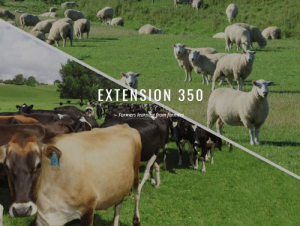Subsidies keeping wind, solar generation viable
OPINION: I recently wrote an open letter to the Prime Minister because at a recent Federated Farmers meeting, Chris Luxon told me wind and solar generation is not subsidised.
 The Extension 350 project aims to lift profitability, environmental sustainability and wellbeing on Northland farms.
The Extension 350 project aims to lift profitability, environmental sustainability and wellbeing on Northland farms.
A Northland farmer-led extension programme which will eventually involve 245 dairy farmers across Northland has won a national award for economic development.
Extension 350 this month won an Economic Development NZ (EDNZ) Award for Sustainable Development. The awards celebrate best practice in economic development activity throughout New Zealand.
The Extension 350 project aims to lift profitability, environmental sustainability and wellbeing on Northland farms.
Project leader Luke Beehre says the sustainability development award acknowledges the farmers involved in the project, “and in particular the target farmers who have opened their farm businesses up for scrutiny”.
The project, with seven dairy ‘clusters’ and three sheep and beef clusters, started in November 2016, and over five years will involve 350 farmers including 245 dairy farmers.
Beehre says the concept involves mentor farmers and farm consultants working with target farmers to improve their farm business. The target farmers then share what they have learned with associate farmers.
“We’re seeing great results in the three key areas of profitability, environmental sustainability and wellbeing on the individual farms and we are now starting to see that this project has the potential to transform Northland’s agricultural sector,” says Beehre.
EDNZ chief executive Susan Houston says the Economic Development NZ's Awards committee considered the Extension 350 project to be a best practice example of sustainable development.
“Extension 350 is a smart and savvy use of land that will have beneficial economic and environmental ramifications for present and future Northlanders,” she says.
“Extension 350 could just as easily have been considered for the Innovation Award since it is breaking new ground, not just for Northland but also for New Zealand.”
Extension 350 is supported by Northland Inc and funded by DairyNZ, Beef + Lamb NZ, Northland Regional Council and Ministry for Primary Industries (MPI). E350 is a project within the Northland Tai Tokerau Economic Action Plan.
The Meat Industry Association of New Zealand (MIA) today announced that Chief Executive Officer Sirma Karapeeva has resigned from the role.
The winners of the 2026 Hawke’s Bay/Wairarapa Dairy Industry Awards were announced at the annual awards dinner held at Copthorne Solway Park in Masterton on Thursday evening.
Environment Southland is welcoming this week’s decision by the Environmental Protection Authority (EPA) to approve the release of Blaptea elguetai, a leaf‑feeding beetle that will help control the highly invasive Chilean flame creeper.
This March, the potato industry is proudly celebrating International Women’s Day on 8 March alongside the International Year of the Woman Farmer, recognising the vital role women play across every part of the sector — from paddocks and packhouses to research, leadership, and innovation.
Fruit trader Seeka posted a record profit and returns to shareholders in 2025.
Recent weather events in the Bay of Plenty, Gisborne/Tairawhiti, and Canterbury have been declared a medium-scale adverse event.